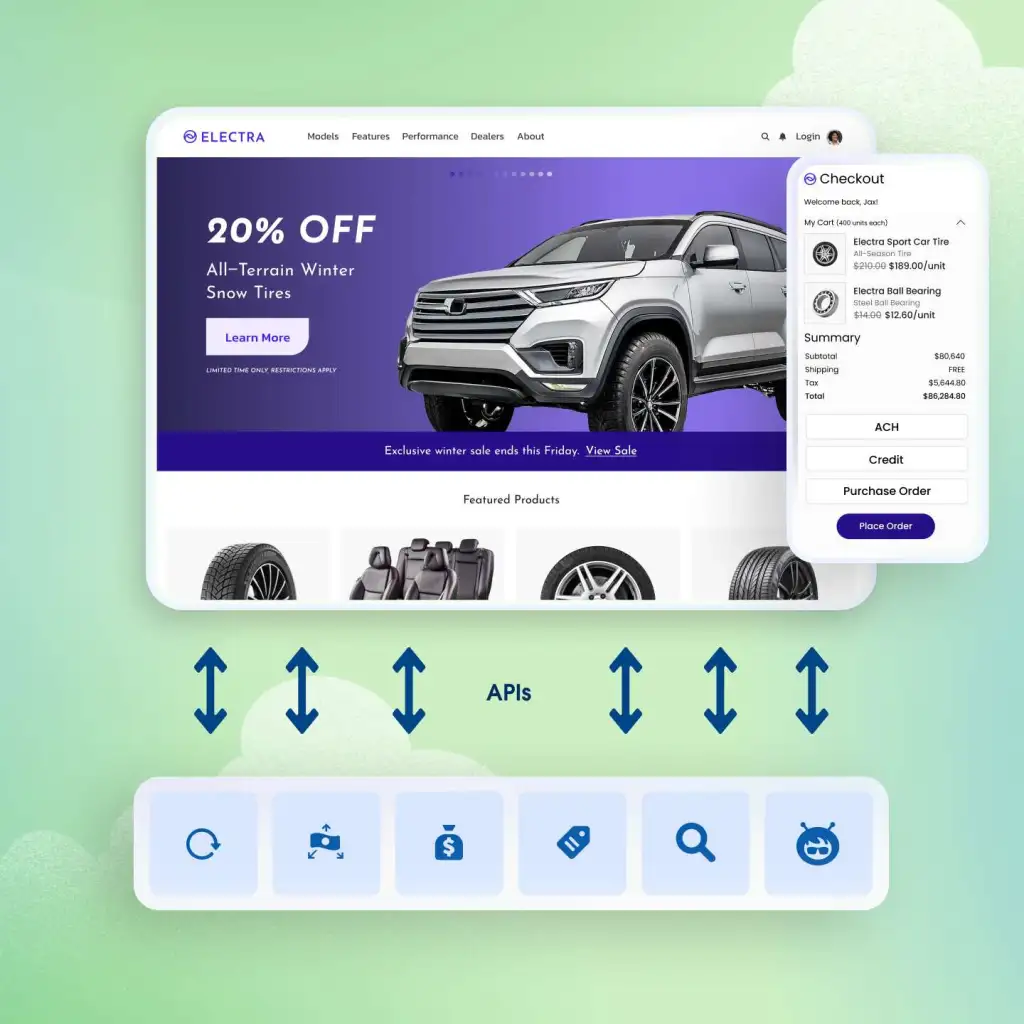Salesforce Commerce Cloud is a popular choice for enterprise eCommerce users. It is packed with top-notch features to help your online business boost sales and grow beyond borders. However, before investing, businesses often look for Salesforce reviews to understand its strengths, weaknesses, and overall value.
In this article, we will provide a detailed analysis of Salesforce Commerce Cloud to make an informed decision. Let's explore different perspectives of this platform, including:
- Pricing
- Ease of use
- Design & customizability
- Reports & analytics
- AI automation
- Multichannel selling
- Security
- Support
Additionally, we will also analyze Salesforce reviews from both experts and real users to offer a balanced perspective.
So, without further delays, let's get started!
A Brief Understanding of Salesforce Commerce Cloud
An introduction to Salesforce Commerce Cloud
Salesforce Commerce Cloud is a cloud-based eCommerce platform designed for mid-sized to large businesses. Previously known as Demandware, it has quickly evolved into a robust solution integrated with Salesforce’s ecosystem, including CRM, marketing automation, and AI-powered analytics. After nearly 10 years of growth, Salesforce Commerce Cloud has successfully made its name among the best B2B eCommerce platforms.
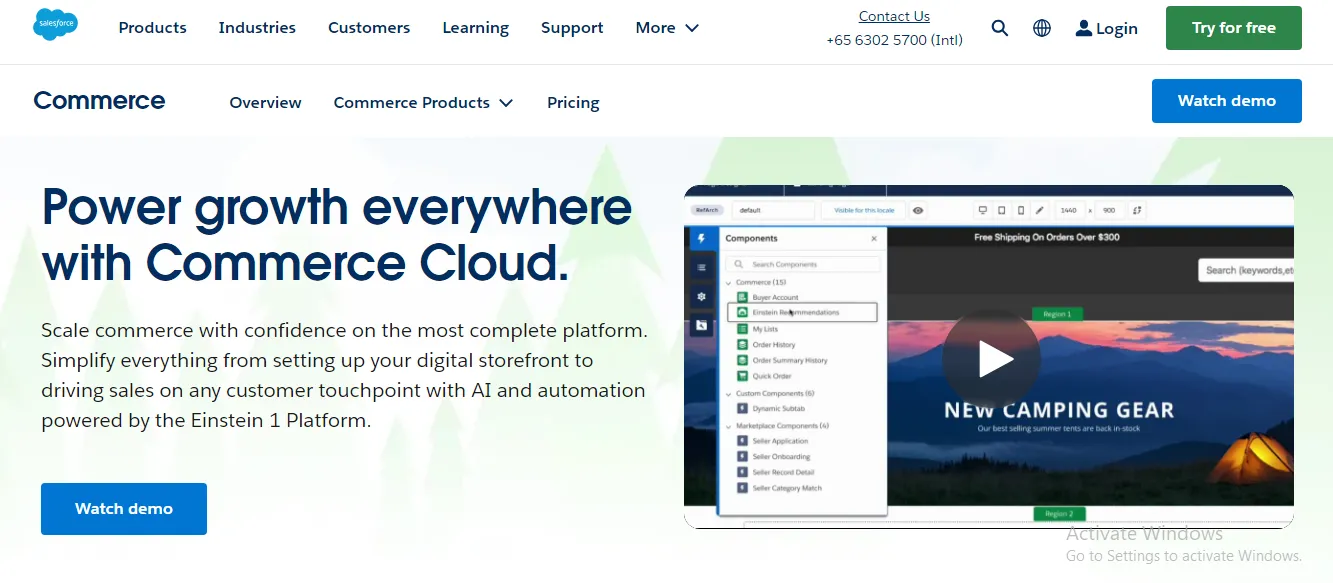
While Salesforce Commerce Cloud offers enterprise-grade capabilities, it may not be ideal for small businesses. The platform requires technical expertise, and its pricing is higher than many competitors. However, for companies looking for scalability, advanced automation, and deep Salesforce integration, it remains a leading choice in the eCommerce market.
Salesforce Commerce Cloud pros and cons
Salesforce Commerce Cloud is a powerful platform, yet it also comes with both advantages and challenges. Below, we break down the key pros and cons to help you decide if it’s the right fit for your business.
Pros | Cons |
✓ Offers AI-powered personalization with Salesforce Einstein for automated product recommendations and predictive analytics. | − Charges high licensing and implementation costs, making it less suitable for small businesses. |
✓ Supports online, mobile, and in-store sales within a single system. | − Requires experienced developers for customization and setup. |
✓ Integrates seamlessly with Salesforce CRM, Marketing Cloud, and Service Cloud. | − Is often reported for slow response time and inconsistent support quality. |
✓ Handles high traffic and large product catalogs efficiently. | − Requires time and training for teams to fully utilize its features. |
✓ Provides advanced analytics and reporting for deep insights into customer behavior, sales, and performance. | - Lacks a wide range of ready-to-use themes like Shopify or Wix. |
✓ Offers built-in fraud protection, PCI compliance, and data encryption. |
Salesforce Reviews At A Glance
Our thoughts on Salesforce Commerce Cloud
From our own experience, Salesforce Commerce Cloud is a powerful yet complex eCommerce platform. It stands out for its AI-driven automation, omnichannel capabilities, and deep integration with the Salesforce ecosystem. However, it is not the best fit for everyone.
Our experts at LitExtension believe that Salesforce Commerce Cloud is ideal for:
- Companies with high traffic and extensive product catalogs that require scalability.
- Companies relying on Salesforce CRM, Marketing Cloud, and Service Cloud will benefit from seamless integration
- Organizations that require data-driven decision-making and want to leverage Salesforce Einstein AI for automation and personalization.
- Businesses that can invest in dedicated development teams for custom development and feature enhancements.
On the other hand, we will not recommend Salesforce Commerce Cloud for:
- Small and mid-sized businesses that operate on a tight budget.
- Non-technical eCommerce store owner looking for a simple, plug-and-play solution who don't require a high level of customization.
All in all, we think that Salesforce Commerce Cloud is best suited for enterprises that need advanced AI-driven automation, omnichannel management, and deep integration with the Salesforce ecosystem. However, its cost, complexity, and reliance on development expertise make it a less favorable choice for small businesses or those looking for a quick, low-maintenance eCommerce setup.
If you want to consider other alternatives, please check out our comparison below for more information:
- Shopify vs Salesforce Commerce Cloud: Which Should You Choose?
- Detailed commercetools vs Salesforce Commerce Cloud Comparison
Salesforce reviews from other users
From what we observe, this platform receives generally positive Salesforce reviews from its users. Overall, it gets 4.4/5 on G2 and 4.5/5 on Capterra, with lots of praise for its seamless integration and powerful features.
Let's take a look at some outstanding Salesforce reviews to see what other business owners are talking about this platform.
“It integrates smoothly with Salesforce CRM and other Salesforce products, which makes managing customer relationships, marketing, sales, and commerce in a unified ecosystem much easier. This is particularly valuable for B2B businesses that need to streamline workflows between sales, customer service, and e-commerce.”
– Reviewed by Bhavin S. on G2
“Overall, it is a great platform for any business and CRM department. Automation and ease of access makes this a very user friendly platform to use.”
– Reviewed by Omar K. on Capterra
Salesforce Commerce Cloud Pricing
The first criterion that we want to mention in our Salesforce reviews today is its pricing structure.
Similar to Shopify Plus pricing, Salesforce Commerce Cloud does not have publicly available pricing, as costs vary based on business size, sales volume, and required features. Instead of a fixed subscription fee, the platform follows a revenue-based pricing model, which means businesses pay a percentage of their gross merchandise value (GMV).
Built with two different business types in mind, Salesforce Commerce Cloud offers two different lines of Salesforce pricing dedicated to B2B and B2C businesses.
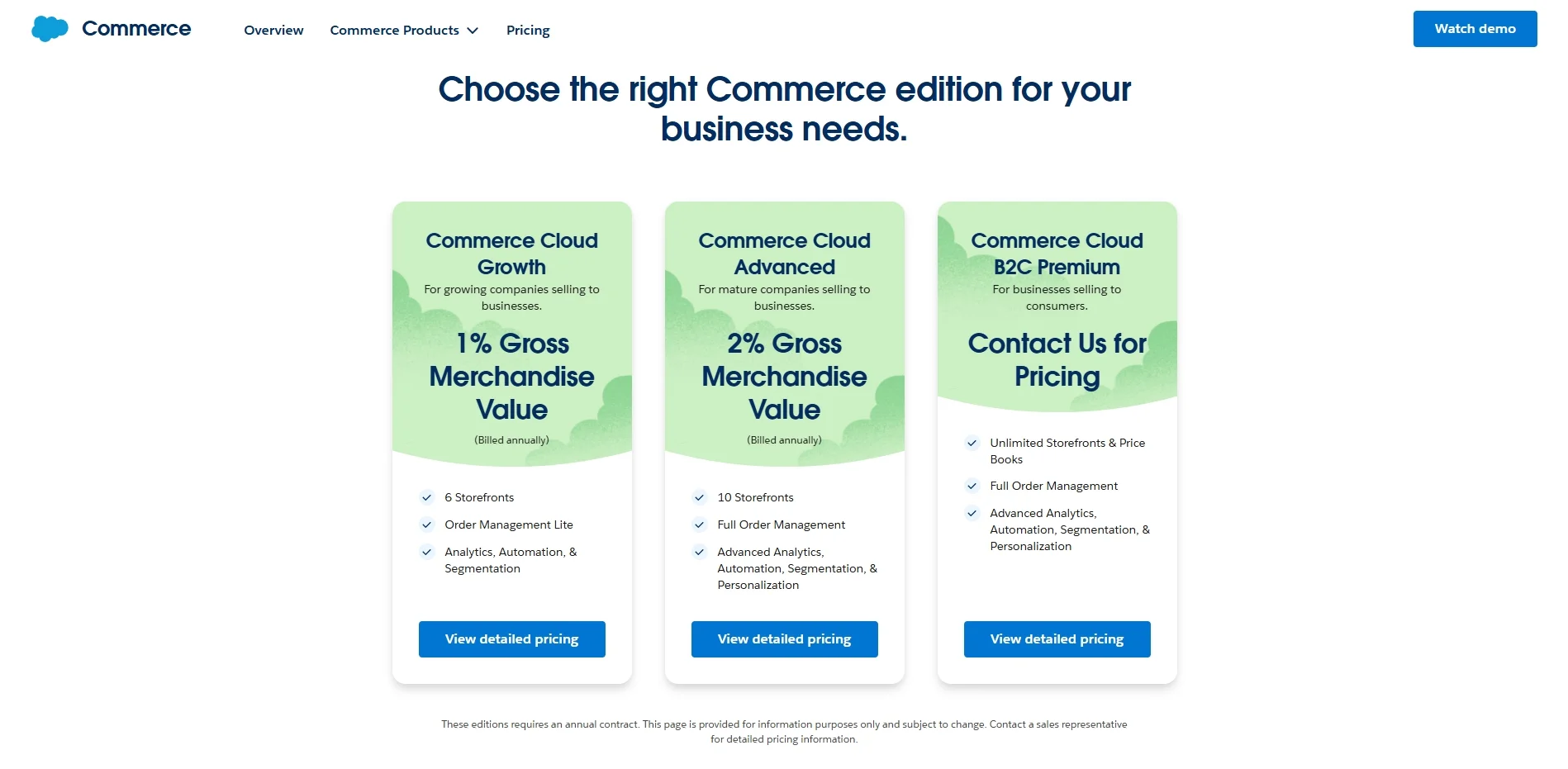
For B2B businesses, Salesforce Commerce Cloud offers two pricing tiers: Commerce Cloud Growth and Commerce Cloud Advanced. Both plans operate on a revenue-based pricing model and comes with different features to support your growth.
Commerce Cloud Growth | Commerce Cloud Advanced | |
Pricing | 1% GMV | 2% GMV |
Storefronts | 6 storefronts | 10 storefronts |
Inventory locations | 20 inventory locations | 20 inventory locations |
Order management | Order Management Lite | Full Order Management |
Data cloud for eCommerce | Analytics & segmentation | Advanced analytics & segmentation |
Data cloud credits | 250K credits | 500K credits |
Agentforce | Merchant Agent | Merchant Agent |
Einstein requests | 60K requests | 120K requests |
CRM analytics | 3 users | 5 users |
Knowledge management | 3 users | 5 users |
In our opinion, Commerce Cloud Growth is best suited for businesses needing basic order management and analytics while keeping costs lower at 1% GMV. On the other hand, Commerce Cloud Advanced includes full order management, advanced analytics, and higher AI and data cloud limits, making it better for larger enterprises with more complex needs but at a higher cost of 2% GMV.
Now, let's talk about Salesforce Commerce Cloud pricing for B2C. This platforms comes with three different tiers specifically dedicated to this business type.
B2C Commerce Growth | B2C Commerce Plus | Commerce Cloud B2C Premium | |
Pricing | 2% GMV | 3% GMV | Custom pricing |
Sites | 5 | Unlimited | Unlimited |
Price books | 10 | Unlimited | Unlimited |
On-demand sandbox credits | 1.2 Million | 2 Million | 2 Million |
Order management | Not applicable | Not applicable | Full Order Management |
Data cloud credits | Not applicable | Not applicable | 500K credits |
Data cloud for Commerce | Not applicable | Not applicable | Advanced Analytics, Automation, Segmentation, & Personalization |
CRM analytics | Not applicable | Not applicable | 7 users |
From our experience, B2C Commerce Growth is best for growing businesses needing up to 5 sites and basic eCommerce capabilities. Meanwhile, the Plus tier, with unlimited sites and price books, is more suitable for brands with large-scale operations. And lastly, designed for larger business scale, the Commerce Cloud B2C Premium includes full order management, advanced analytics, AI automation, and deep customer segmentation tools.
Ease of Use
Salesforce Commerce Cloud is a powerful solution, yet many Salesforce reviews highlight its steep learning curve. But is it true that Salesforce Commerce Cloud is not a user-friendly eCommerce platform? Let's find out in the next section of our Salesforce reviews.
We must say that, unlike platforms with drag-and-drop interfaces, Salesforce Commerce Cloud requires technical expertise for setup, customization, and ongoing management. It provides a feature-rich dashboard with several tools and settings available, but it is not beginner-friendly overall. Navigating the dashboard requires a structured approach since essential functions like product management, order processing, and customer insights are deeply integrated into the platform.
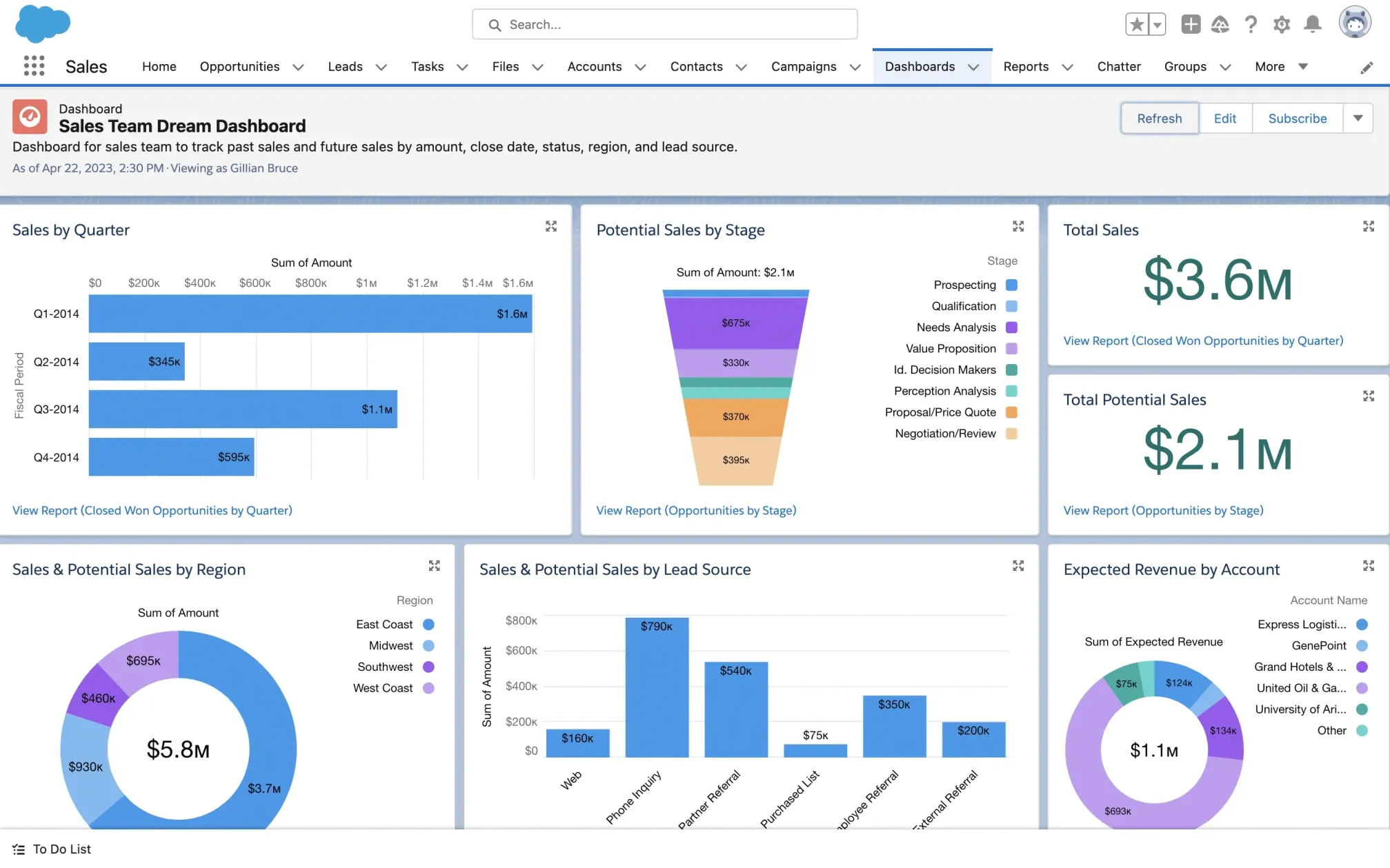
While this setup provides enterprise-level control, it lacks the simplicity of more user-friendly platforms like Shopify or Wix. Businesses already using Salesforce CRM, Marketing Cloud, or Sevice Cloud will have an easier time adapting, but those new to the Salesforce ecosystem may need extensive training.
Design & Customizability
Coming next on our Salesforce reviews today is its customizability. Salesforce Commerce Cloud offers highly flexible customization options, but it requires technical expertise to implement. Businesses have full control over their storefront layout, user experience, and functionality, but customization is typically done through Salesforce’s developer tools.
- Headless Commerce capabilities: Businesses can use a custom front-end while keeping Salesforce Commerce Cloud as the back-end engine for more flexibility.
- Custom UI & storefront design: Developers can create unique storefronts using JavaScript frameworks like React or Vue.js.
- Advanced personalization: AI-driven merchandising tools allow for dynamic content based on customer behavior.
While these features allow for complete design control, they also mean that customization requires time, effort, and technical expertise.
eCommerce Features
Reports & analytics
Next on our Salesforce reviews, let's talk about reports and analytics tools equipped with this platform.
Salesforce Commerce Cloud provides comprehensive reporting and analytics features, allowing businesses to track sales performance, customer behavior, and marketing effectiveness. It gives businesses access to key performance indicators (KPIs) such as:
- Sales and revenue tracking: Monitor overall sales, conversion rates, and revenue growth.
- Customer insights: Analyze shopping behavior, customer lifetime value (CLV), and retention trends.
- Marketing performance: Track the effectiveness of email campaigns, promotions, and paid advertising.
- Inventory and order analytics: Monitor stock levels, fulfillment rates, and order processing efficiency.

For businesses needing custom reports, Salesforce Commerce Cloud integrates with Data Cloud for Commerce, which allows for:
- Advanced analytics and segmentation to filter data based on customer demographics, location, or purchase history.
- Custom dashboards and reports tailored to business needs.
- Integration with Salesforce CRM to align eCommerce insights with sales and marketing data.
AI automation
Another outstanding feature that we want to discuss in our Salesforce reviews today is Einstein AI, an advanced machine learning and artificial intelligence system designed to automate analytics, personalize customer experiences, and optimize business decisions. This artificial intelligence processes large volumes of real-time data to provide actionable insights that drive revenue growth and improve customer engagement.
We've seen several Salesforce reviews highlight Einstein AI as a key differentiator, allowing businesses to leverage predictive analytics, automation, and deep customer insights. However, some users note that maximizing its potential requires proper configuration and ongoing optimization.
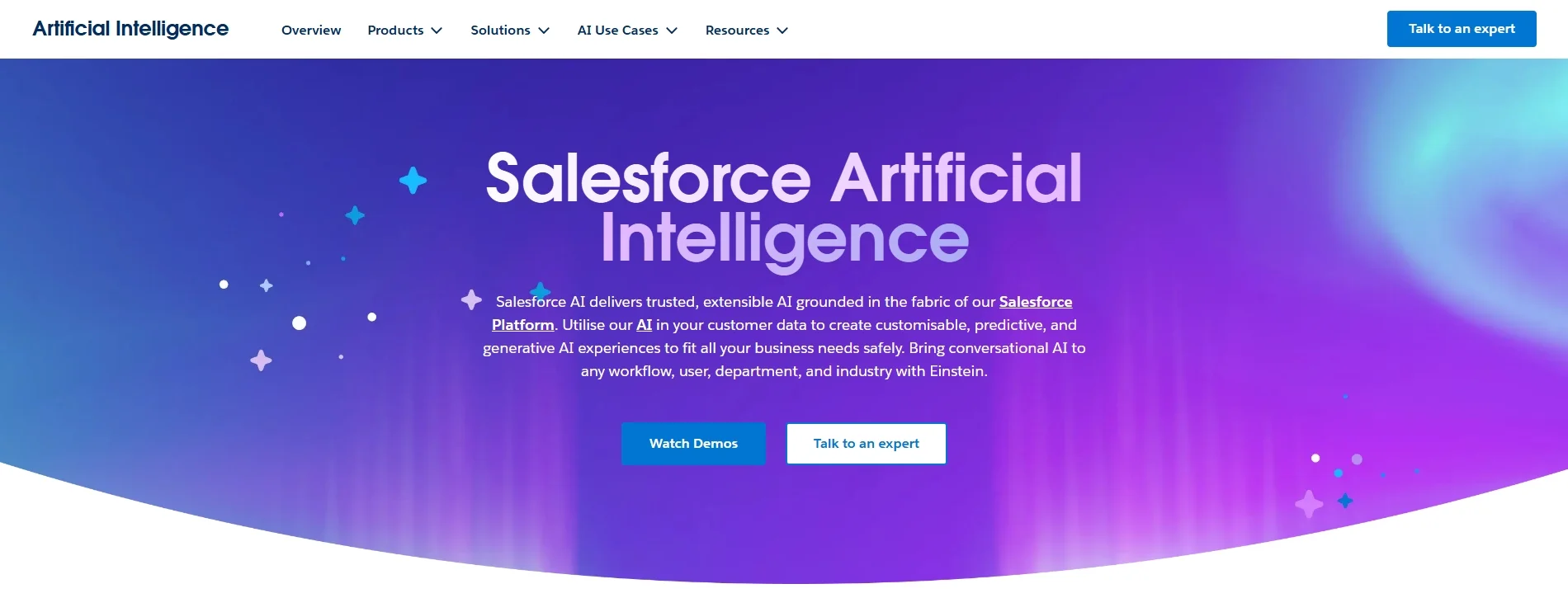
Einstein AI enables businesses to:
- Forecast trends, identify risks, and optimize sales strategies based on historical and real-time data.
- Provide personalized product recommendations based on customer interactions and individual preferences
- Improve site search experience by making it more intuitive, relevant, and conversion-focused.
- Create highly targeted campaigns by analyzing customer behavior.
In short, Einstein AI is one of the biggest advantages of Salesforce Commerce Cloud, offering advanced automation, predictive analytics, and personalized customer experiences. It opens the door for businesses to increase sales and improve engagement through intelligent recommendations and real-time data analysis. However, you must be prepared to invest time and resources into properly configuring the system.
Multichannel selling
As one of the best multichannel eCommerce platforms, Salesforce Commerce Cloud excels in this dimension. It allows businesses to sell across multiple platforms, devices, and touchpoints while managing everything from a single system.
One of the standout features of Salesforce Commerce Cloud is its ability to unify commerce across various sales channels. Businesses can operate multiple branded storefronts, sell through mobile-optimized websites and apps, and integrate with major marketplaces like Amazon, eBay, and Walmart. Additionally, brick-and-mortar businesses benefit from features like buy online, pick up in-store (BOPIS), and real-time inventory updates, ensuring customers can switch between channels effortlessly.
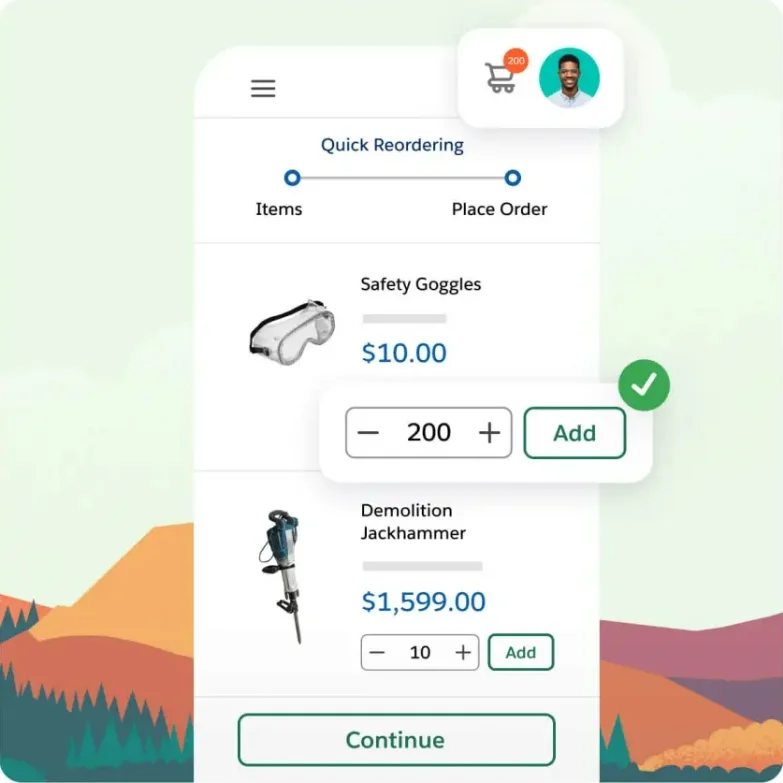
Managing inventory across multiple sales channels is often a challenge, but Salesforce Commerce Cloud addresses this with centralized inventory and order management. The platform provides real-time stock updates, preventing overselling or stock discrepancies between online and offline stores. Businesses can also use automated order routing and fulfillment, which directs shipments based on customer location and warehouse availability.
In short, Salesforce Commerce Cloud is one of the strongest platforms for businesses looking to unify online, mobile, social, and in-store sales.
Security
Security is a critical aspect of any eCommerce platform; that's why we need to include this dimension in today's Salesforce reviews.
Salesforce Commerce Cloud follows strict security protocols to ensure data protection. The platform uses 256-bit SSL encryption for secure data transmission, safeguarding customer information, payment details, and business records from cyber threats. Additionally, Salesforce Commerce Cloud complies with industry security standards, including:
- PCI DSS (Payment Card Industry Data Security Standard): Ensures secure payment processing.
- GDPR (General Data Protection Regulation): Protects customer data privacy for businesses operating in the EU.
- CCPA (California Consumer Privacy Act): Complies with data protection regulations for U.S.-based businesses.
- SOC 2 Certification: Verifies that Salesforce follows strict data security and privacy controls.
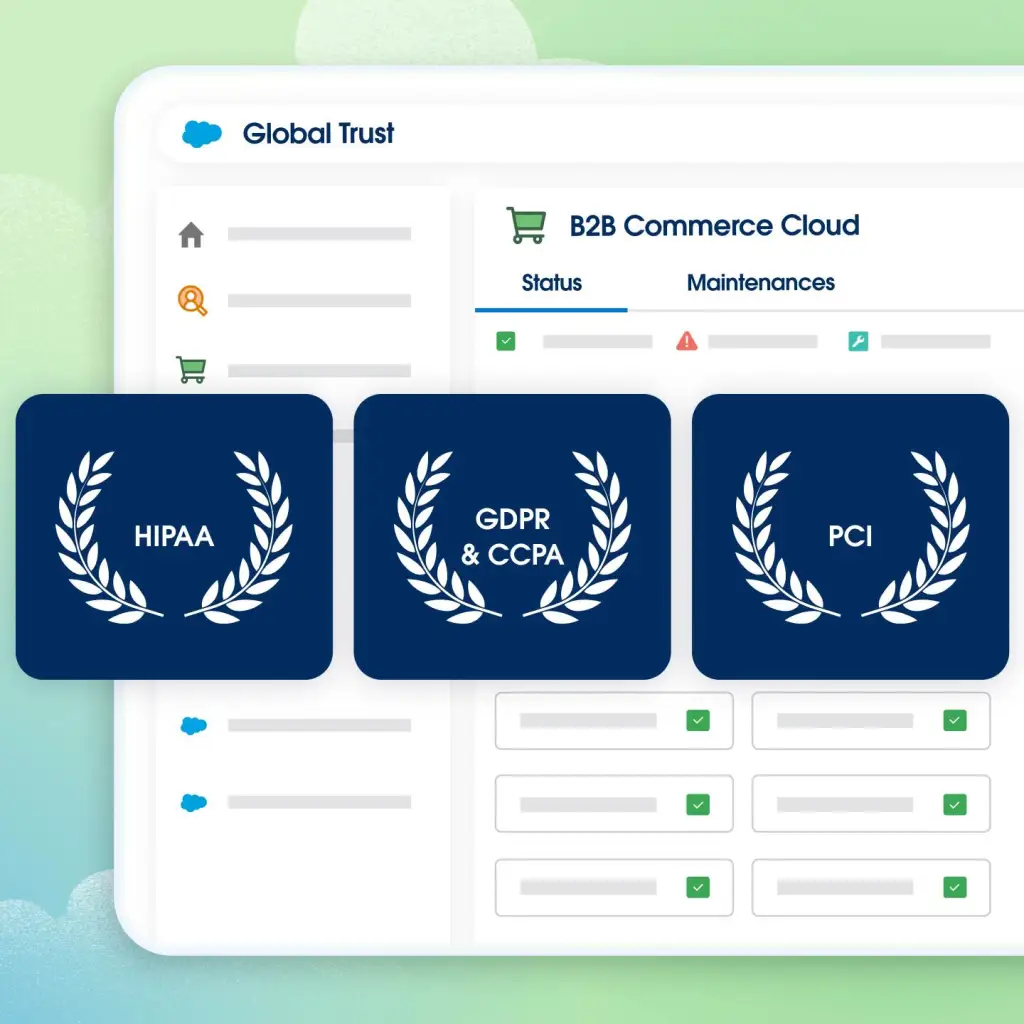
Besides, Salesforce Commerce Cloud also includes AI-powered fraud detection tools to protect businesses from fraudulent transactions and cyber threats. Einstein AI monitors real-time transaction data and detects unusual purchase patterns, helping merchants prevent chargebacks, identity theft, and suspicious activity.
To conclude our Salesforce reviews on security, Salesforce Commerce Cloud offers robust security features, ensuring data protection, fraud prevention, and compliance with global standards, making it a trusted choice for enterprise businesses.
Support
Last but not least, we cannot forget to mention support in our Salesforce reviews.
Salesforce Commerce Cloud offers various ways for businesses to get assistance, including a Help Center, a self-learning platform called Trailhead, a large Community Forum, Support Tickets, Live chat & phone calls, and a dedicated Account Manager. With that being said, please note that the quality and accessibility of support depend on the service plan.
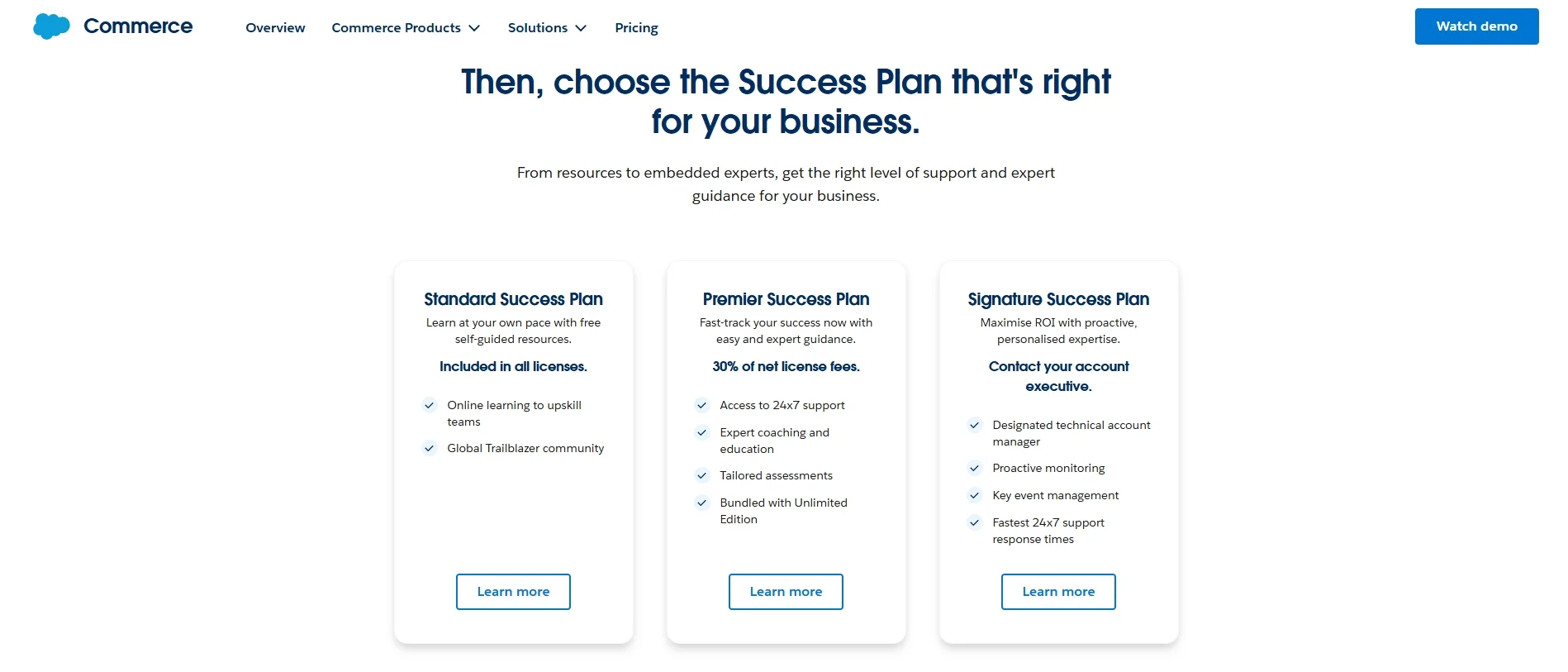
While the platform offers 24/7 technical assistance, self-service resources, and a strong community, we must admit that these resources can be too technical for beginners. In this case, consider upgrading your Success Plan to get a dedicated Account Manager for guidance and advice.
Salesforce Reviews – FAQs
What are the benefits of Salesforce Commerce Cloud?
Salesforce Commerce Cloud offers enterprise-level eCommerce capabilities, making it a powerful choice for large businesses. Its key benefits include:
- AI-driven personalization
- Omnichannel selling
- High scalability & performance
- Seamless integration with Salesforce ecosystem
- Advanced security & compliance
What is the difference between Salesforce and Salesforce Commerce Cloud?
Salesforce is a broad technology ecosystem offering CRM, marketing automation, customer service, and business intelligence solutions.
Salesforce Commerce Cloud, on the other hand, is a specific eCommerce platform within the Salesforce ecosystem. It is designed to help businesses manage online stores, personalize shopping experiences, and optimize digital commerce operations.
Who is Salesforce Commerce Cloud for?
Salesforce Commerce Cloud is designed for:
- Enterprise retailers managing multiple sales channels (online, mobile, in-store, marketplaces).
- Global brands that need multi-language, multi-currency, and regional tax support.
- Companies already using Salesforce CRM and want to integrate their customer data with eCommerce operations.
- Businesses needing AI-driven personalization, automated merchandising, and predictive analytics.
Is Salesforce Commerce Cloud B2B or B2C?
Salesforce Commerce Cloud supports both B2B and B2C eCommerce, offering separate solutions tailored to each business model.
- Salesforce B2C Commerce Cloud: Designed for direct-to-consumer (DTC) brands, featuring AI-powered product recommendations, dynamic pricing, and omnichannel sales capabilities.
- Salesforce B2B Commerce Cloud: Built for wholesale and business-to-business transactions, providing bulk ordering, account-based pricing, and self-service portals for B2B buyers.
Final Verdict
And that brings us to the end of our Salesforce reviews today. In short, Salesforce Commerce Cloud is a powerful, enterprise-grade eCommerce platform designed for businesses that require AI-driven automation, scalability, and omnichannel capabilities. However, the platform also comes with a steep learning curve, high costs, and technical complexity, which can make it challenging for small to mid-sized businesses or those without dedicated development teams.
If your business prioritizes advanced automation, multi-store management, and deep data insights, Salesforce Commerce Cloud is a solid investment. Nonetheless, if you are looking for a more user-friendly, cost-effective eCommerce solution, you might need to seek other alternatives.
Like this article? Please don't hesitate to check out other articles on our LitExtension website for more expert tips and insights.
